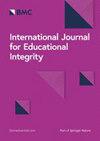Italian academic system disregards scientific merit in faculty hiring processes
IF 6.9
Q1 EDUCATION & EDUCATIONAL RESEARCH
International Journal for Educational Integrity
Pub Date : 2023-12-01
DOI:10.1007/s40979-023-00145-0
引用次数: 0
Abstract
Professorships in Italy are assigned following public competitions. However, favouritism affects faculty hiring. Researchers lacking clientelistic support remain excluded from academia and are obliged to seek employment abroad or at non-university institutions, or to abandon their career. Do non-recruited researchers have better or worse scientific capacity than those who have attained professorships in Italy? Files regarding the competitions in bibliometric disciplines won by 186 professors in Florence were analysed. An equal number of professors recruited at other Italian universities and scientists who never attained professorship in Italy were randomly drawn from the pool of individuals having national scientific qualification (the prerequisite for professorship) in the same disciplines as each Florentine professor. H-indexes of the year of qualification (T1), of the Florence call (T2), and in July 2021 (T3) were obtained from Scopus. Non-recruited individuals were more likely (Chi-square test) to show a higher H-index than both Florentine (T1 p = 0.0005, T2 p = 0.0015, T3 p = 0.0095) and non-Florentine professors (T1 p = 0.0078, T2 p = 0.0245, T3 p = 0.0500). Fifty-four non-recruited scientists serve in foreign universities, 100 at national/international research centres. The remaining scientists (25 who continue producing despite precarious employment, and seven who have stopped publishing) were as likely as Florentine (T3 p = 0.69) and non-Florentine (T3 p = 0.14) professors to show a higher H-index. Italian faculty hiring disregards merit. A more challenging qualification would limit the access of researchers with lower scientific capacity, and favour those with greater proficiency. As it stands, competition is useless. Once professors obtain permanent employment, they seem less motivated to publish.意大利的学术体系在聘用教师的过程中忽视了科学价值
意大利的教授职位是在公开竞争之后分配的。然而,偏袒会影响教师招聘。缺乏裙带关系支持的研究人员仍然被排除在学术界之外,被迫在国外或非大学机构寻找工作,或者放弃他们的职业生涯。与那些在意大利获得教授职位的研究人员相比,未被招募的研究人员的科学能力是更好还是更差?对佛罗伦萨186名教授在文献计量学科竞赛中获胜的资料进行了分析。从与每一位佛罗伦萨教授具有相同学科的国家科学资格(教授资格的先决条件)的个人中随机抽取从意大利其他大学征聘的相同数量的教授和从未在意大利获得教授职位的科学家。资格年(T1)、Florence call (T2)和2021年7月(T3)的h指数来源于Scopus。非招募个体的h指数更有可能(卡方检验)高于佛罗伦萨教授(T1 p = 0.0005, T2 p = 0.0015, T3 p = 0.0095)和非佛罗伦萨教授(T1 p = 0.0078, T2 p = 0.0245, T3 p = 0.0500)。54名未受聘的科学家在外国大学任职,100名在国家/国际研究中心任职。剩下的科学家(25名在不稳定的工作中继续进行研究的科学家,7名停止发表论文的科学家)与佛罗伦萨(T3 p = 0.69)和非佛罗伦萨(T3 p = 0.14)教授一样,显示出更高的h指数。意大利的教师招聘不看重成绩。一个更具挑战性的资格将限制科学能力较低的科学家获得,而有利于那些更熟练的科学家。就目前而言,竞争是无用的。一旦教授获得了长期工作,他们似乎就不那么有动力发表论文了。
本文章由计算机程序翻译,如有差异,请以英文原文为准。
求助全文
约1分钟内获得全文
求助全文
来源期刊

International Journal for Educational Integrity
EDUCATION & EDUCATIONAL RESEARCH-
CiteScore
6.90
自引率
26.10%
发文量
25
审稿时长
22 weeks
 求助内容:
求助内容: 应助结果提醒方式:
应助结果提醒方式:


